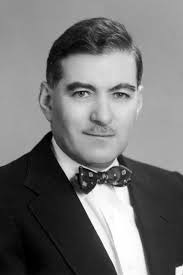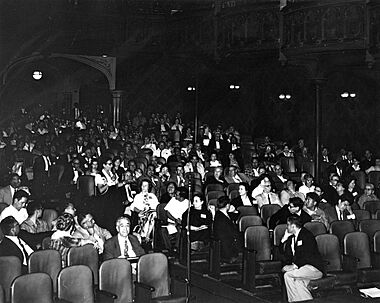Sol Tax facts for kids
Quick facts for kids
Sol Tax
|
|
|---|---|
 |
|
| Born | 30 October 1907 Milwaukee, Wisconsin, U.S.
|
| Died | 4 January 1995 (aged 87) |
| Nationality | American |
| Alma mater | University of Wisconsin (Ph.B, 1931) University of Chicago (Ph.D, 1935) |
| Known for | Fox Indians |
| Awards | Viking Fund Medal (1961) Bronislaw Malinowski Award (1977) |
| Scientific career | |
| Fields | anthropology |
Sol Tax (born October 30, 1907 – died January 4, 1995) was an American anthropologist. An anthropologist is a scientist who studies human societies and cultures. Sol Tax is famous for creating something called "action anthropology." He also studied the Meskwaki, or Fox, Indians, and helped start an important academic magazine called Current Anthropology. He earned his advanced degree from the University of Chicago in 1935.
Contents
Early Life and Education
Sol Tax grew up in Milwaukee, Wisconsin. When he was young, he was part of different social groups. He even got "arrested" once by a group called the Newsboys Republic for breaking their rules!
He started college at the University of Chicago. But he had to leave because he didn't have enough money. He then went to the University of Wisconsin–Madison. Later, he returned to the University of Chicago and earned his Ph.D. (a high-level degree) in 1935. In 1940, he became a teacher at the University of Chicago and taught there for many years.
Key Contributions
Sol Tax helped organize two big events. In 1959, he was the main organizer for the 1959 Darwin Centennial Celebration at the University of Chicago. This event celebrated the 100-year anniversary of Charles Darwin's book on evolution.
He also helped organize the 1961 American Indian Chicago Conference. He worked with the National Congress of American Indians and a Native American organizer named Willard LaMere. This conference was very important. It led to the Statement of Indian Purpose. This statement was the first major step toward Native American tribes having more control over their own lives and futures.
Awards and Recognition
In 1977, the American Anthropological Association gave Sol Tax and another person, Bela Maday, the Franz Boas award. This award is given for excellent service to the field of anthropology. Sol Tax was also the president of this association in 1959.
What is Action Anthropology?
Sol Tax is known for starting "Action Anthropology." This is a way of studying cultures where anthropologists don't just watch from afar. Instead, they work with the people they are studying. The main goals are to "learn and help" at the same time.
A great example of Action Anthropology is the 1961 American Indian Chicago Conference (AICC). Sol Tax was a lead organizer for this event. From June 13 to June 20, 1961, 460 Native Americans from 90 different tribes met at the University of Chicago. The goal was to help "all Indians of the whole nation to express their own views." They wrote a shared document called the "Declaration of Indian Purpose."
In 1962, President John F. Kennedy received this declaration at the White House. The ideas in this document, especially the idea of self-determination (meaning tribes deciding for themselves), became very important. They helped shape Native American movements later on, like the Red Power movement.
Sol Tax also helped the Native American Educational Services College (NAES College) when it started in 1974. He served on its academic review committee and later on its board of directors until 1993. NAES College said that Tax played a "key role" in helping them create a vision for Native American higher education. This vision focused on community development that respected Native cultures. Tax's special idea was to include field projects in the college's lessons. This meant students would learn by doing real projects in their communities.
Published Works
- (1937, revised 1955) Contributions to Social Anthropology of North American Tribes, edited by Fred Eggan.
- (2001) Doing Fieldwork: The Correspondence of Robert Redfield and Sol Tax, edited by Robert A. Rubinstein. This book shares letters between two anthropologists about their work.
- (1953, revised 1972) Penny Capitalism; a Guatemalan Indian economy. Sol Tax is said to have created the term 'Penny capitalism'. This term describes small-scale economic activities.
- (1988) Pride and Puzzlement: A Retro-introspective Record of 60 Years of Anthropology in the Annual Review of Anthropology.
See Also
- Bronislaw Malinowski Award
- Sol Tax Distinguished Service Award
 | Laphonza Butler |
 | Daisy Bates |
 | Elizabeth Piper Ensley |


